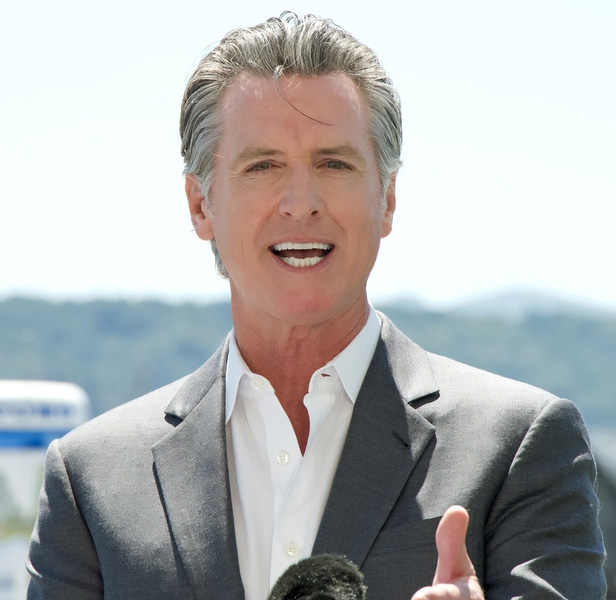Key Takeaways
• The Suit: California is suing President Trump over tariffs, claiming he does not possess the legal authority under IEEPA to impose the duties unilaterally.
• Harm: The lawsuit argues the tariffs will cause massive damage to California’s economy – and that they violate the U.S. Supreme Court’s major questions doctrine.
• Counterpoint: The White House defends the tariffs as legal and necessary for addressing trade deficits and national security threats.
California is taking President Donald Trump to court.
The Golden State became the first state in the nation to sue Trump and members of his administration over tariffs that the president has enacted on imports.

Similar to other recently filed cases against the administration and its tariffs, the California lawsuit says presidents do not have the legal power to unilaterally impose tariffs under the International Economic Emergency Powers Act (IEEPA) – the legislation Trump has cited as a key brick in his legal foundation for implementing a baseline tariff of 10% on all imports, a 145% levy rate on China-made goods that’s in addition to other tariffs he put on that country during his first term, and duties on goods originating from Canada and Mexico not covered by the United States-Mexico-Canada Agreement.
“President Trump’s unlawful tariffs are wreaking chaos on California families, businesses and our economy – driving up prices and threatening jobs,” said Golden State Gov. Gavin Newsom. “We’re standing up for American families who can’t afford to let the chaos continue.”
Filed in U.S. District Court for the Northern District of California, the lawsuit asks a federal judge to declare Trump’s tariffs void and enjoin their implementation.
Newsom and California Attorney General Rob Bonta noted that California has the largest economy of any state. Its gross domestic product was $3.9 trillion in 2023, making it 50% bigger than the GDP of the nation’s next-largest state economy, Texas. If it was its own nation, California would have the fifth largest economy in the world – and that economy stands to lose “hundreds of billions” of dollars if the levies are allowed to proceed, the lawsuit says.
“The president’s chaotic and haphazard implementation of tariffs is not only deeply troubling, it’s illegal,” said Bonta. “California understands global trade policy is not just a game. … This game the president is playing has very real consequences for Californians across our state.”
White House Responds
The White House shot back.
“Instead of focusing on California’s rampant crime, homelessness and unaffordability, Gavin Newsom is spending his time trying to block President Trump’s historic efforts to finally address the national emergency of our country’s persistent goods trade deficits,” White House Spokesperson Kush Desai told POLITICO in a statement Wednesday.
In part, Trump invoked IEEPA to implement the tariffs. The law empowers a president to use emergency economic powers only after declaring a national emergency in response to an “unusual and extraordinary threat” – particularly to national security, foreign policy or the U.S. economy, as originating from outside the U.S.

“Instead of focusing on California’s rampant crime, homelessness and unaffordability, Gavin Newsom is spending his time trying to block President Trump’s historic efforts to finally address the national emergency of our country’s persistent goods trade deficits.”
Kush Desai, White House
Trump has, in part, cited trade deficits between the U.S. and other countries as the national emergency. The administration has also argued that the alleged roles of China, Mexico and Canada in allowing fentanyl to enter the United States (as well as illegal immigrant inflow from the latter two nations) constitutes a national emergency that allows the invocation of IEEPA to justify tariffs on those countries.
An executive order Trump signed says: “Large and persistent annual U.S. goods trade deficits have led to the hollowing out of our manufacturing base; resulted in a lack of incentive to increase advanced domestic manufacturing capacity; undermined critical supply chains; and rendered our defense-industrial base dependent on foreign adversaries. … President Trump is invoking his authority under the International Emergency Economic Powers Act of 1977 (IEEPA) to address the national emergency posed by the large and persistent trade deficit…”
California’s Legal Rationale
California authorities suing Trump believe that IEEPA gives a president authority to take certain actions if he declares a national emergency in response to a foreign national security, foreign policy or economic threat. However, tariffs aren’t one of those actions, according to California. The suit notes this is the first time a president has attempted to rely on IEEPA to impose tariffs.
The lawsuit cites the U.S. Supreme Court’s major questions doctrine as the foundation upon which a federal judge should negate the tariffs. Essentially, California argues the doctrine makes it necessary for Congress to approve actions in “novel matters of vast economic and political significance.”

“The president’s chaotic and haphazard implementation of tariffs is not only deeply troubling, it’s illegal.
Rob Bonta, California Attorney General
In recent years, the suit says, the Supreme Court has used this standard to strike down other broad federal initiatives, including President Obama’s Clean Power Plan and President Biden’s student loan forgiveness program, ruling that novel executive actions with broad impacts on the national economy cannot rest on vague statutory authority, Newsom and Bonta asserted.
“It is difficult to imagine a more economically significant set of actions than the one Trump is taking on tariffs,” Newsom’s office said in a press statement. “The Court, applying this doctrine even-handedly, will find that such expansive action absent congressional approval is a clear violation of the law.”
Trump is facing at least three other lawsuits over the tariffs. For instance, Liberty Justice Center, a Libertarian nonprofit public-interest litigation firm based in Austin, TX, has sued the Trump administration in the U.S. Court of International Trade on behalf of five small businesses, asserting that the president lacks the legal authority to issue tariffs on countries around the globe without congressional approval. That suit also cites misapplication of IEEPA as grounds for abolishing the levies.
Tariffs have been the defining issue for the promotional products industry in 2025. The market imports the vast majority of products it sells in the United States. Soaring tariff rates are making products/importing much more expensive and prompting a scramble to adapt sourcing practices while creating marketplace uncertainty that, executives say, is inhibiting business.


